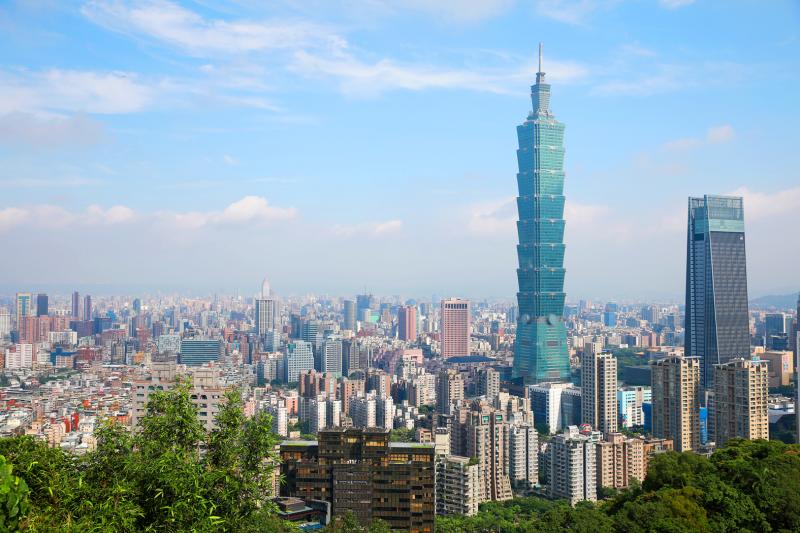Taipei took 11th spot in the latest real-estate investment prospects rankings for the Asia-Pacific region, a survey by PricewaterhouseCoopers (PwC) and the Urban Land Institute showed.
In the “Emerging Trends in Real Estate Asia-Pacific 2021” ranking, Taipei rose three notches from a year earlier to 11th place among 22 cities in the region, due to Taiwan’s efforts to fend off the COVID-19 pandemic, PwC said.
Taipei has also enjoyed ample liquidity, and the investment prospects in the city’s real-estate market have been recognized by many investors, it said.

Photo: Cheng I-hwa, Bloomberg
“Certainly, in a handful of Asia-Pacific cities where the impact of COVID-19 is currently minimal, there has been little sign of slowing demand. Taipei is one market where leasing activity remains solid,” PwC said in a report on the survey.
Taipei was at the bottom in 22nd place in 2017 and 2018, and ranked No. 21 last year, before taking 14th position this year, PwC said.
Singapore, Tokyo and Sydney took the top three spots respectively, while Seoul was in fourth place, the survey found.
Shanghai was seventh, Shenzhen ninth and Beijing 12th, while Hong Kong was last.
PwC said the poll highlighted the evolving trends shaping the real-estate industry in the Asia-Pacific.
The report on the survey included proprietary data and insights from 391 leading real-estate industry experts in the region.

SEMICONDUCTORS: The German laser and plasma generator company will expand its local services as its specialized offerings support Taiwan’s semiconductor industries Trumpf SE + Co KG, a global leader in supplying laser technology and plasma generators used in chip production, is expanding its investments in Taiwan in an effort to deeply integrate into the global semiconductor supply chain in the pursuit of growth. The company, headquartered in Ditzingen, Germany, has invested significantly in a newly inaugurated regional technical center for plasma generators in Taoyuan, its latest expansion in Taiwan after being engaged in various industries for more than 25 years. The center, the first of its kind Trumpf built outside Germany, aims to serve customers from Taiwan, Japan, Southeast Asia and South Korea,

Gasoline and diesel prices at domestic fuel stations are to fall NT$0.2 per liter this week, down for a second consecutive week, CPC Corp, Taiwan (台灣中油) and Formosa Petrochemical Corp (台塑石化) announced yesterday. Effective today, gasoline prices at CPC and Formosa stations are to drop to NT$26.4, NT$27.9 and NT$29.9 per liter for 92, 95 and 98-octane unleaded gasoline respectively, the companies said in separate statements. The price of premium diesel is to fall to NT$24.8 per liter at CPC stations and NT$24.6 at Formosa pumps, they said. The price adjustments came even as international crude oil prices rose last week, as traders

POWERING UP: PSUs for AI servers made up about 50% of Delta’s total server PSU revenue during the first three quarters of last year, the company said Power supply and electronic components maker Delta Electronics Inc (台達電) reported record-high revenue of NT$161.61 billion (US$5.11 billion) for last quarter and said it remains positive about this quarter. Last quarter’s figure was up 7.6 percent from the previous quarter and 41.51 percent higher than a year earlier, and largely in line with Yuanta Securities Investment Consulting Co’s (元大投顧) forecast of NT$160 billion. Delta’s annual revenue last year rose 31.76 percent year-on-year to NT$554.89 billion, also a record high for the company. Its strong performance reflected continued demand for high-performance power solutions and advanced liquid-cooling products used in artificial intelligence (AI) data centers,

SIZE MATTERS: TSMC started phasing out 8-inch wafer production last year, while Samsung is more aggressively retiring 8-inch capacity, TrendForce said Chipmakers are expected to raise prices of 8-inch wafers by up to 20 percent this year on concern over supply constraints as major contract chipmakers Taiwan Semiconductor Manufacturing Co (TSMC, 台積電) and Samsung Electronics Co gradually retire less advanced wafer capacity, TrendForce Corp (集邦科技) said yesterday. It is the first significant across-the-board price hike since a global semiconductor correction in 2023, the Taipei-based market researcher said in a report. Global 8-inch wafer capacity slid 0.3 percent year-on-year last year, although 8-inch wafer prices still hovered at relatively stable levels throughout the year, TrendForce said. The downward trend is expected to continue this year,